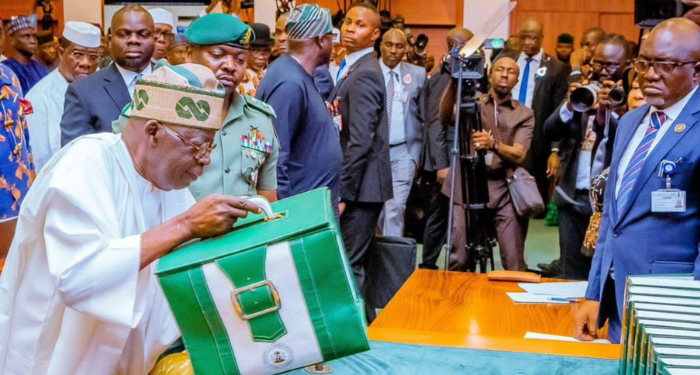7 highlights of Nigeria’s 2024 budget
“The target is to increase the ratio of revenue to GDP from less than 10 percent currently to 18 percent within the current term of this Administration,” Baguda said while adding that efforts will, however, focus on improving tax administration and collection efficiency.

The Nigerian Government intends to spend 30 percent of its 2024 budget on debt servicing, allocating less to critical sectors of the economy.
The 2024 aggregate expenditure is estimated at N27.50 trillion which is 10.8 percent higher than N24.82 trillion in 2023, according to the public presentation by Abubakar Bagudu, minister of Budget and Economic Planning on Wednesday.
- Advertisement -
Africa’s biggest economy budgeted N8.25 trillion (30 percent) for debt servicing in 2024 while critical sectors of the economy such as education was allocated N2.18 trillion (7.9 %), and the health sector, N1.33 trillion (five percent).
- Advertisement -
Infrastructure, defence, social development & poverty reduction were allocated N1.32 trillion (five percent), N3.25 trillion (12 %) and N534 billion (two percent) respectively in the budget.
Here are key highlights from the 2024 budget:
Education Sector (7.9%)
The education sector was allocated N2.18 trillion in the 2024 budget which indicates 7.9 percent of the total budget.
The amount provided for the Federal Ministry of Education and its agencies, including recurrent and capital expenditure was N1.23 trillion. The provision for Universal Basic Education Commission (UBEC), transfers to the Tertiary Education Trust Fund for infrastructure projects in tertiary institutions stood at N700 billion.
Health sector (5%)
The sector was allocated N1.33 trillion in the budget which is five percent of the total budget. The amount provided for the Federal Ministry of Health and its agencies (recurrent and capital expenditure) stood at N1.07 trillion, Gavi/ Immunisation funds, including Counterpart Funding for Donor Supported Programmes at N137.21 billion, transfer to Basic Healthcare Provision Fund was one percent of CRF at N125.74 billion.
Infrastructure (5%)
The government allocated N1.32 trillion to infrastructure which represents five percent of the total FGN 2024 budget. Infrastructure includes provisions for works and housing, power, transport, water resources and aviation.
Social Development and Poverty Reduction Programme (2%)
The government allocated N534 billion for social development and poverty reduction programmes, representing two percent of the total budget.
- Advertisement -
Defence and Security Sector (12 %)
The defence and security sector has been allocated N3.25 trillion, representing 12 percent of the budget.
FG’s actual revenue was more than its projected target in the first 9 months of 2023
According to the budget document, the retained revenue was N8.65 trillion, approximately 104.5 percent of the prorata target of N8.28 trillion as of September 2023.
“The FGN share of oil revenues was N1.42 billion (84.7 percent performance), while non-oil tax revenues totalled N2.50 trillion (a performance of 135 percent,” it said.
It added that company income tax and value added tax collections were N1.55 trillion and N318.95 billion, representing 221.4 percent and 111 percent of their respective targets.
“Revenue generation remains the major fiscal constraint to Nigeria’s fiscal viability. However, the government is reviewing current tax and fiscal policies with the view to improving revenue generation,” Bagudu said.
Revenue to GDP ratio to increase to 18 percent from 10 percent
The government aims to increase revenue to GDP ratio to 18 percent from 10 percent.
“The target is to increase the ratio of revenue to GDP from less than 10 percent currently to 18 percent within the current term of this Administration,” Baguda said while adding that efforts will, however, focus on improving tax administration and collection efficiency.
The minister said the government will make efforts to further contain financial leakages through the effective implementation of key public finance management reforms.
- Advertisement -



